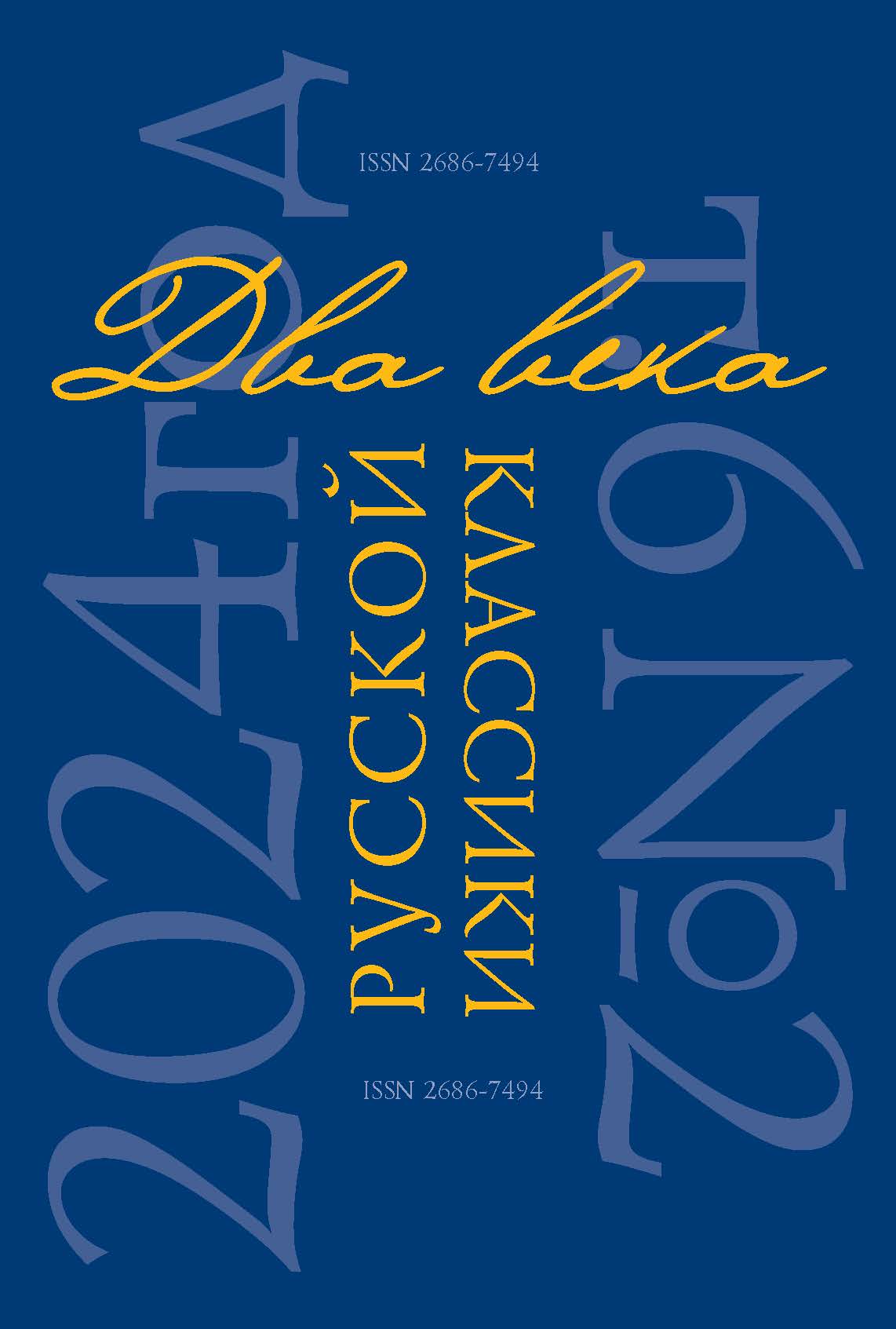Abstract: The article considers poetics and the structure of the narration of Nikolai Leskov’s novel “The Cathedral Clergy” (“Cathedral Folk”). This novel is regarded as a top artistic achievement of Nikolai Leskov. The paper reveals semantic emphasis relevant to the titles of three drafts of Nikokai Leskov’s chronicle as well as different visions of poetics of the genre of “The Cathedral Clergy” (“Cathedral Folk”). The text emphasises the dialogue between Nikolai Leskov and both secular and ecclesiastical writings and focuses on hagiographic plots and motifs, on correlations between hagiography and icon, between hagiographic, hymnographic and liturgical images. The author puts forward a hypothesis about isomorphism of the architecture of the five-domed Stargorod Cathedral and the five parts of the chronicle. The article analyses principles of Nikolai Leskov’s “temple narration” from within. The writer moves from sacral and innermost patterns to natural, historic and common images, from iconostasis to temple scenery and eventually to the soul of the protagonist. Savely Tuberozov’s “Speech” in the first part of the chronicle is associated with his “Deed” (profession of faith) in the last two “most temple and liturgical” parts. They are expected to put an end to hagiographies of the three characters with their focus on development. Nikolai Leskov’ ideal character proves to be a collegiate image struggling with personal priorities. The more collegiate this person is the more unique and symbolic he seems to be. Nikolai Leskov’s ideal images reach the level of iconographic symbolism. The paper brings up the issue of correlations one may find between Nikolai Leskov’s narration and ecclesiastical hymnography, as well as between verbal and sound images.
References
Vidmarovich N. P. “Khudozhnik niskhozhdeniya” [“A Descent Writer”]. Teoriya Traditsii: Khristianstvo i russkaya slovesnost [Theory of Tradition: Christianity and Russian Literature]. Izhevsk: Izdatelstvo “Udmurtskiy Universitet” Publ., 2009, pp. 186–201. (In Russ.)
Voly`nskij A. N. S. Leskov: klassik v neklassicheskom osveshhenii [N. S. Leskov: classic in non-classical lighting]. St. Petersburg, Vladimir Dal` Publ., 2011, pp. 36–154. (In Russ.)
Govorukha-Otrok Yu. N. Leskov i ego kritiki. Po povody statyi Skabichevskogo “Chem otlichaetsya napravleniye v iskusstve ot partiynosti” [Leskov and his critics. With regards to Skabichevsky’s article “What is the difference between an artistic movement and party affiliation? Govorukha-Otrok Yu. N. Vo chto verovali russkiye pisateli? Literaturnaya kritika i religiozno-philosophskaya publitsistika [What did Russian writers believe in? Lit-crit and religious and philosophic journalism ]. In 2 vols. St. Petersburg, Rostok Publ., 2012, pp. 68–81. (In Russ.)
Durylin S. N. Nikolay Semyenovich Leskov. Opyt kharakteristiki lichnosti i religioznogo tvorchestva [Nikolay Semyenovich Leskov. Practice of personal characteristic and religious writing] URL: http://www.mirfilologa.ru/sergei-durilin/7-main/91-durylin-sn-nikolaj-semenovich-leskov-opyt-kharakteristiki-lichnosti-i-religioznogo-tvorchestva (access date: 12.09.19). (In Russ.)
Esaulov I. A. Paskhalnost russkoy slovesnosti [Paschalness of Russian literature]. Moscow: Krug Publ., 2004, 560 p. (In Russ.)
Zabelin I. E. Istoriya goroda Moskvy [The history of Moscow]. Moscow, AST: Astrel: Khranitel Publ., 2007. 768 p. (In Russ.)
Zaitsev B. K. Otbleski vechnogo. Neizvestnye rasskazy, esse, vospominaniya, interview [Glints of eternal: unknown stories, essays, memoires, interviews. St. Petersburg, Rostok Publ., 2018, pp. 276–285. (In Russ.)
Izmajlov A. A. Leskov i ego vremya [Leskov and his time]. N. S. Leskov: klassik v neklassicheskom osveshhenii [N. S. Leskov: classic in non-classical lighting]. St. Petersburg, Vladimir Dal` Publ, 2011, pp. 157–440 (In Russ.)
Kashkin A. S. Ustav pravoslavnogo bogosluzheniya [Charter of Orthodox worship services]. Uchebnoye posobiye po Liturgike [Study guide on Liturgics]. Saratov: Izdatelstvo Saratovskoy eparkhii Publ., 2010, 687 p. (In Russ.)
Lebedev Yu. V. Sudby Rossii v tvorcheskom nasledii I. S. Turgeneva, F. I. Tyutcheva, N. S. Leskova [Fortunes of Russian in legacy of I. S. Turgenev, F. I. Tutcheyv, N. S. Leskov]. Oryol: Izdatelskiy dom “Orlovskaya literatura i knigoizdatelstvo i K” Publ., 2007, 272 p. (In Russ.)
Lepakhin V. V. Ikona v russkoy khudozhestvennoy literature [Icon in Russian imaginative literature]. Moscow, Otchiy dom Publ, 2002, 736 p. (In Russ.)
Leskov A. N. Zhizn Nikolaya Leskova po ego lichnim, semeynym i nesemeynym zapisyam i pamyatyam [The life of Nikolay Leskov as reflected in his personal, family and non-family notes and records]. Tula: Priokskoye knizhnoe izdatelstvo Publ., 1981, 647 p. (In Russ.)
Leskov N. S. Sobr. soch.: v 12 t. [Collected edition in 12 vols.]. Moscow, Pravda, 1989, vol. 1, 479 p. (In Russ.)
Likhachyev D. S. Osobennosti poetiki N. S. Leskova [Peculiarities of N. S. Leskov’s poetic style]. Leskov i Russkaya literatura [Leskov and Russian literature]. Moscow: Nauka Publ., 1988, pp. 5–13. (In Russ.)
Mosaleva G. V. Poetika N. S. Leskova [N. S. Leskov’s poetics]. Izhevsk, Izdatelstvo Udmurtskogo Universiteta Publ., 2009, 108 p. (In Russ.)
Mosaleva G. V. Izography russkoy slovesnosti: A. N. Ostrovsky, N S. Leskov, I. S. Shmelyev [Icon-painters of Russian literature: A. N. Ostrovsky, N. S. Leskov, I. S. Shmelyev]. Izhevsk: Izdatelskiy Tsentr Udmurtskogo Universiteta Publ., 2019, 196 p. (In Russ.)









